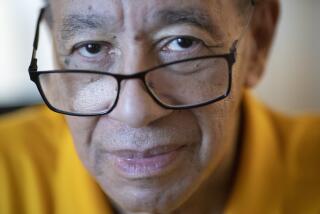COLUMN ONE : A Welfare State in Retreat : New Zealand pioneered free health care, sick pay and old-age pensions. Now the safety net is being shredded, leaving thousands to seek shelter and food handouts.
- Share via
AUCKLAND, New Zealand — On a cold August afternoon, as a bitter wind whips the rain-soaked streets, Joe Mana swallows his pride to feed his wife and three children.
“It’s the first time I’ve had to ask for food parcels,” said the 33-year-old former factory supervisor as he picked up donated groceries at a downtown food bank. “But it’s the only way we can eat.
“I’ve worked my whole life,” Mana added softly while his 2-year-old daughter, Ruby, gnawed on a frozen loaf of bread. “And now I can’t get a job or feed my family. Do you know what that feels like?”
A growing number of families here do. In what has become New Zealand’s winter of discontent, thousands of families are suddenly seeking food from churches and missions. Others crowd into garages and trailers, out of work and out of luck. Still others are protesting, marching and burning politicians in effigy.
“There’s a revolution going on,” said Ian Middletown, 62, an angry invalid who fears losing his apartment. “A downward revolution in lifestyle.”
It’s all part of the dismantling of one of the world’s first and most comprehensive welfare states in a desperate attempt to revive an economy mired in the worst recession since the Great Depression of the 1930s.
In a budget announced July 30, Prime Minister Jim Bolger announced plans to end universal free health care and education, privatize state housing, trim old-age pensions and chop other once-sacred social programs. Added to cuts made earlier, the budget has meant social upheaval for many of New Zealand’s 3.4 million people.
“We have tried devaluation, tried protectionism, tried massive borrowing, tried almost everything except living within our means,” Bolger said in a speech defending his policies.
Bolger argued that the “cradle-to-grave” welfare state was going broke: 1.1 million workers pay taxes to support an equal number of pensioners and welfare beneficiaries, as well as their spouses and children. A rocketing foreign debt, chronic overspending, fast-rising 10.1% unemployment and negative economic growth have created a crisis, he said.
“We have come to the end of debtor’s row,” Bolger warned. “The next step takes us into the Third World. We must all have the honesty to accept that New Zealand can’t run a first-class social system on the strength of a third-rate economy.”
Several European welfare states also are retrenching. In Sweden, for example, the Social Democratic government last winter proposed eliminating 10% of state jobs and slashing its $45-billion welfare budget. The goal, officials said, was to curb welfare dependencies and rocketing costs in the nation of 8 million.
It was a sharp turnaround for the Social Democrats, who had championed many of the benefits and have dominated Swedish politics since before World War II--too sharp, as it turned out. With elections approaching, most of the cuts were restored in the final budget, but it was not enough to keep the Social Democrats in office. In parliamentary elections Sept. 15, they went down in defeat at the hands of center-right parties, which are expected to try to reverse the course of Sweden’s cradle-to-grave socialism.
Ironically, New Zealand pioneered many of those programs. It began in the 1890s with a 40-hour workweek, women’s suffrage and a pension of 18 English pounds a year for people 65 years old who had led a “sober and respectable life.” Such pensions, said Richard Sedden, the prime minister of that day, would “be copied by . . . the whole of the English-speaking peoples of the world.”
In 1938, New Zealand consolidated various programs to create what many called the world’s most extensive welfare system. It ultimately included free health and education, sick pay, disability and old-age pensions, child care, unemployment and numerous other benefits.
But government spending has outpaced economic growth in this mostly agricultural country since the early 1970s, saddling it with huge debts. Deregulation in the 1980s didn’t help. A March report by the Organization for Economic Cooperation and Development called the result an “insular, inefficient, increasingly rigid and inflation-prone economy.”
Attitudes and values are harder to gauge but just as critical.
A recent Massey University study, for example, concluded that the work culture “has systematically taught New Zealanders that they can get by with little effort or skill and yet be guaranteed comfort, luxuries and security in life. . . . Our past good fortune has enabled us to become one of the most ill-educated, low-skilled ‘advanced’ countries in the world.”
Retired locomotive engineer Bill Logue agrees. Built like a fireplug, the 66-year-old, white-haired Scot has worked all his life. He and his 75-year-old wife, Phyllis, still work as volunteers at a street center for the unemployed.
“Young people have been brought up to believe they’re owed everything,” he said, shaking his head. “They’ve got no incentive to do anything for themselves. I think they’re mollycoddled.”
Still, few are happy that the rugged South Pacific nation that saw itself as an enlightened leftist role model for the West now is parroting the pare-down policies of Ronald Reagan and Margaret Thatcher.
“It reverses institutions and attitudes that have been in place since the Depression,” said a diplomat in Wellington. “But how do you take a population that’s been pampered for 60 years and tell them they’ve got to be lean and mean?”
Bolger’s conservative National Party government was elected last October determined to try. It began with the poor last April, slashing benefits by 12% to 25% for the unemployed, the sick and single mothers. It also scrapped a benefit paid to parents for every child. Nearly a third of the population was immediately affected.
“A lot of people are in shock,” said the Rev. Paul Bathurst, head of the Auckland City Mission, which handed out 200 free food packages in July, four times more than a year ago. “There’s a sense of hopelessness.”
At least 25 emergency food banks have opened in Auckland, the largest city, with others busy in every major town. The Red Cross has appealed for blankets and bedding to help needy families in one of the coldest winters in years. (Seasons in the Southern Hemisphere are opposite those in the Northern Hemisphere.) Emergency housing is at a premium.
“People lived a bare existence before,” said Auckland University poverty researcher Bruce Jesson. “Now they’re being pushed over the line. They’re losing their homes. Going bankrupt. Moving into caravan (trailer) parks. Or back with their parents. It’s a disaster.”
Other reforms are aimed at the middle class. Free health care, from doctors to drugs, will end for most families. The new fees are low by U.S. standards--a maximum of $29 a night for a public hospital bed, for example--but many say the impact is real.
“I think there’s a significant number of people who will have to think very hard as to whether they can afford to see the doctor,” said Dr. David Gollogly, a physician in the largely poor Otahuhu area of south Auckland.
Under the new budget, so-called “Kiwi Cards” will be issued to the poor--defined as those earning less than $9,860 a year--as identification to obtain free medicine, prescriptions and other benefits.
The average university student now pays $754 in fees and tuition.
“People will clearly pay more,” said Ruth Butterworth, head of the Assn. of University Staff. “It’s peanuts in the American context. But it’s being brought in overnight. And people don’t save. That’s the critical thing.”
The state’s near-monopoly as a provider of low-rent housing will be effectively privatized, raising subsidized rents and mortgages to market rates for 115,000 families. Critics raise the grim specter of America’s homeless, warning that New Zealand may face a similar future.
“It’s extremely scary,” said Shirleen Casey, 34, an unemployed, divorced mother who fears she may lose her home. “We see news clippings from America of people sleeping in the streets. It’s quite clear that policy doesn’t work. So what the hell are we doing following their example?
“Yesterday I had to go to church and ask for a food parcel,” she said, fighting back tears. “My son says a lot of boys go without lunch. They pinch (steal) each other’s shoes. They pinch each other’s lunch.”
Even “superannuation” pensions, an entitlement similar to America’s Social Security, will be cut for many elderly people. A stiff new standard will sharply reduce pension payments to those earning more than $46 a week in private income.
“It’s pretty cruel,” complained George Drain, head of the Superannuitants’ Federation, a lobbying group for the elderly. He estimates that one-third of the 515,000 pensioners will lose money. “In many ways, it’s tantamount to theft.”
It has also shocked younger people. “The concept of me taking responsibility for my own retirement is something I’ve never thought of before,” said Sheyne Tettau, a 36-year-old social worker. “I never had to. And I’ve got six in my family.”
Radical changes weren’t limited to social programs. A law passed in May scrapped compulsory union membership, ended unions’ statutory bargaining rights and banned closed shops. The effect was to sharply curtail powerful trade union influence here.
“We’re losing our contracts and we’re losing our members,” said Bill Andersen, head of the Auckland chapter of the New Zealand Council of Trade Unions. “For all intents and purposes, we’re out as unions.”
Not everyone disagrees with what Finance Minister Ruth Richardson has termed “stiff medicine” and her critics have dubbed “Ruth-anasia.” Much of the business community is backing it.
“To be realistic, there’s not much the government can do,” said John Garlick, 50, a computer systems analyst. “The cupboard is bare.”
So, however, is political support. Protests have dogged Bolger and other Cabinet ministers, and dozens of new members of Parliament are openly nervous about the assault on people who voted them into office. The next election is in 1993. By then, the government forecasts an unemployment rate of over 12%.
“They’ve obviously put themselves out of government,” said Pat Sneddon, a management consultant. “Everybody knows it.”
But few talk of politics at the Otahuhu Caravan Park, a cluster of 40 small and shabby trailers filled with unemployed families in a field of mud behind a row of auto body shops in south Auckland. Electric wires hang off rickety poles. There are no trees, flowers or sidewalks. Raucous laughter from a group drinking beer breaks the afternoon quiet.
In one trailer, 43-year-old Boronia Namana watches TV. She was laid off 18 months ago from a catering service. Her benefits have been cut from $102 to $70 a week. After paying rent and other fixed costs, she says she has only $12 a week for food.
“I still wake every day at half past 4 thinking it’s time to go to work,” she said. “But I can’t find a job. So now I just try to survive.”
More to Read
Sign up for Essential California
The most important California stories and recommendations in your inbox every morning.
You may occasionally receive promotional content from the Los Angeles Times.














